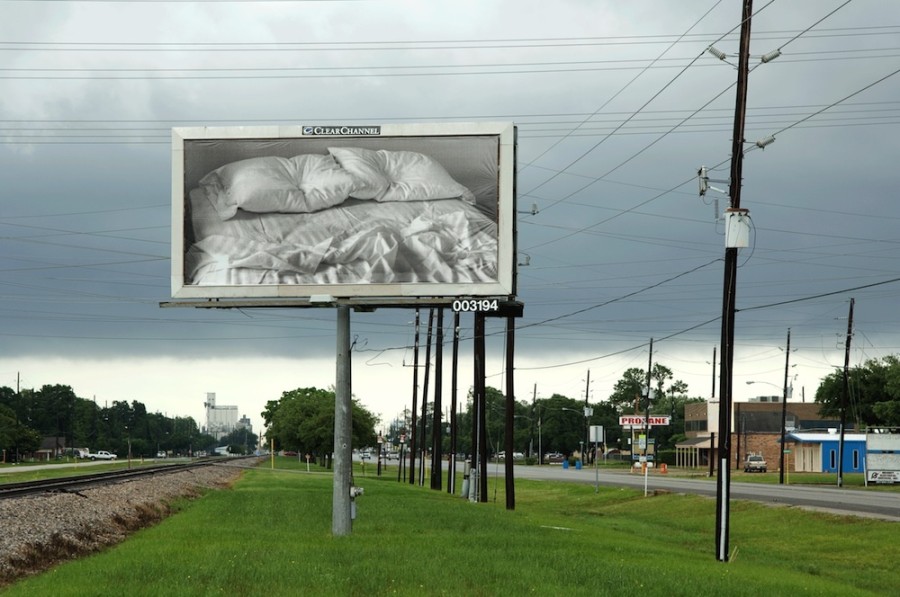
Felix Gonzalez-Torres, “Untitled,” 1991.
Felix’s piece is a lamentation, after the death of his partner, and evokes the emptiness in life after loss.
How can we cultivate a language of loss?
This is a question that haunts, traps, and limits many of us. There is something about grief and mourning that leaves us without words, trapped somewhere between silence and speech. We are not sure what to say, and yet equally unsure how to be silent. Uncomfortable in speech, uncomfortable in silence, we struggle to find a language of loss, a way of navigating between the Scylla of silence and the Charybdis of speech.
It was that most profound of traumas, the Holocaust, that led poets and philosophers, those on the front lines of language, to rethink the very meaning and capacity of language. Theodore Adorno (1903 – 1969) famously put it this way: “to write poetry after Auschwitz is barbaric,” a line that itself has ironically prompted an astounding amount of poetry as people have worked to come to terms with the impossibility of speech, of art, and the equal inability to express pain, suffering, and loss through silence alone. Paul Celan, a Romanian-Jewish German-language poet, wrote poetry after the Holocaust that was infected (or is it broken?) by the rupture in meaning and language that he suffered during the war years, resulting in a sort of poetry that is somehow both nonsensical and deeply painful (“blessed art thou / No One / In thy sight would / we bloom / in thy / spite.”)
This challenge faces the very words we choose when discussing the losses of our life. On a national level, we speak of Churban, Shoah, Holocaust; Each word is complicated with long histories of those who choose to use or not use one or several of these terms, each with its own challenging set of feelings and emotions associated with it. (The poet Jerome Rothenberg, in his book Khurbn, says this about the word Holocaust: “It was a word with which I never felt comfortable: too Christian & too beautiful, too much smacking of a “sacrifice” I didn’t & still don’t understand. The word with which we spoke of it was the Yiddish-Hebrew word, khurbn [khurban], & it was this word that was with me all the time we stayed in Poland.”)
In our own lives, the experience of loss is equally complicated by the language that we use – grief, mourning, loss, each has its own flavor, scent, feeling to it. Loss is somehow the most ambitious, the most vague term of all, and yet also the most precise. Loss; As in lost, something that will yet be found, returned? (According to etymonline.com: lost c. 1300 “wasted, ruined, spent in vain,” and also “no longer to be found, gone astray.”) Loss speaks to the empty space now in our lives, the impossibly full emptiness, the empty seat at the table, unoccupied bed, empty shtetls and shuls. This absence dwells in our communications about loss as well, as we struggle to articulate what loss is to us, and our love for those who are experiencing loss.
How might we develop a language of loss? Rabbi Josh Grajower, in his touching conversation with 18Forty about the loss of his wife, Dannie Grajower, speaks of the importance of therapy in the process of grief, to learn a language of loss for one’s loved ones, one’s children, and one’s self. A qualified therapist can help one develop a realistic and meaningful language of loss.
Today is the 9th of Av, a day marked by a long and profound history of loss for the Jewish people. On this day, the Jewish people honor the profound losses that they experienced as a nation, and as individuals, from the beginning of the Jewish story to today. There is an emptiness at the heart of the 9th of Av, as we honor that and those who are no longer with us. In fact, some commentators see in the hebrew word for the 9th of Av (Tish’a) a reference to the hebrew word for forgetfulness, weakness, displacement (n-sh-y), as we struggle as a people to come to terms with the loss at the heart of our lives. Today, some of us will engage with loss through liturgy, through poetry and prayers, seeking the absent through words. There is also a tradition to refrain from casual conversation on the 9th of Av – perhaps a way to embrace the subtle silence of loss.
Reflecting loss at this moment is not simple, coming after a year in which it felt like every article was about loss, every walk down the street shadowed by endless reminders of the loss of so many of our loved ones to COVID-19. We have nothing to say, have had nothing to say, and yet our year has been complicated by endless speech as we run from silence. Today, we are embracing the language of loss, as we try together to find a way towards meaningful engagement with the losses of our lives. In our conversations with those who have lived with loss, we hope to listen and learn about the language of loss, and consider together how we can cultivate a more compassionate, honest, and vulnerable stance amidst the great pain of mourning. While we reflect on these conversations, we are also reading Liliana Furman and Liliana Ruth Feierstein’s powerful article on the questions of language of loss, “The Paper Bridge: Jewish Responses to Destruction.” This article focuses on the dilemma facing Jews after the Holocaust, as they worked towards a mode of language that provided meaningful response to the rupture. We read this article in light of today, and this year, and wonder: How might we cultivate our own language of loss?


